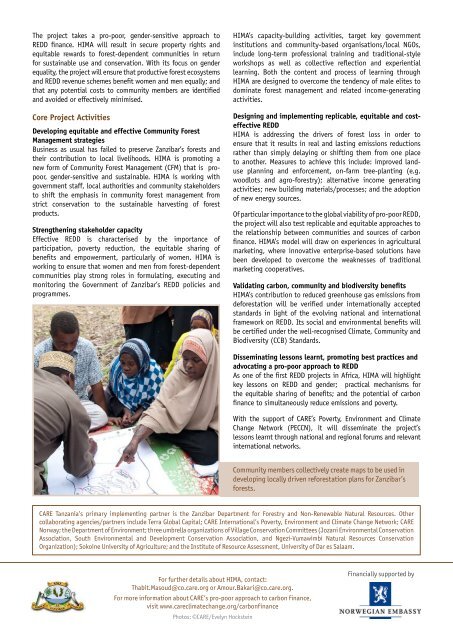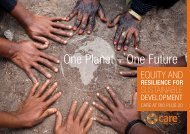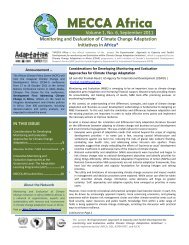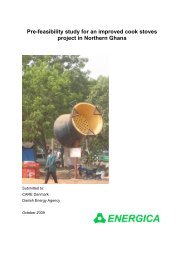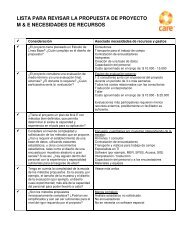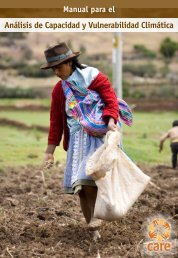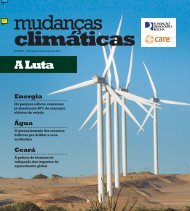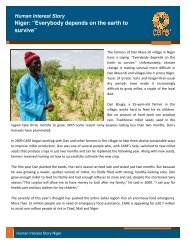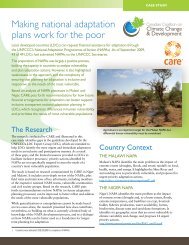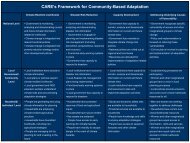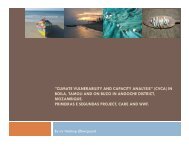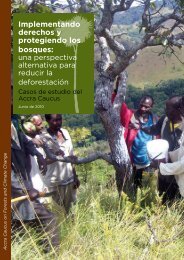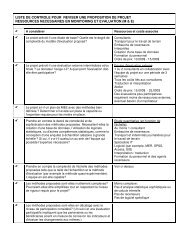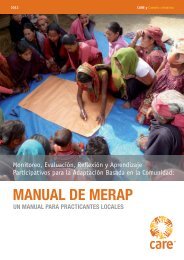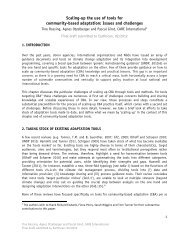Conserving Zanzibar's Natural Forests - CARE Climate Change
Conserving Zanzibar's Natural Forests - CARE Climate Change
Conserving Zanzibar's Natural Forests - CARE Climate Change
You also want an ePaper? Increase the reach of your titles
YUMPU automatically turns print PDFs into web optimized ePapers that Google loves.
The project takes a pro-poor, gender-sensitive approach toREDD finance. HIMA will result in secure property rights andequitable rewards to forest-dependent communities in returnfor sustainable use and conservation. With its focus on genderequality, the project will ensure that productive forest ecosystemsand REDD revenue schemes benefit women and men equally; andthat any potential costs to community members are identifiedand avoided or effectively minimised.Core Project ActivitiesDeveloping equitable and effective Community ForestManagement strategiesBusiness as usual has failed to preserve Zanzibar’s forests andtheir contribution to local livelihoods. HIMA is promoting anew form of Community Forest Management (CFM) that is propoor,gender-sensitive and sustainable. HIMA is working withgovernment staff, local authorities and community stakeholdersto shift the emphasis in community forest management fromstrict conservation to the sustainable harvesting of forestproducts.Strengthening stakeholder capacityEffective REDD is characterised by the importance ofparticipation, poverty reduction, the equitable sharing ofbenefits and empowerment, particularly of women. HIMA isworking to ensure that women and men from forest-dependentcommunities play strong roles in formulating, executing andmonitoring the Government of Zanzibar’s REDD policies andprogrammes.HIMA’s capacity-building activities, target key governmentinstitutions and community-based organisations/local NGOs,include long-term professional training and traditional-styleworkshops as well as collective reflection and experientiallearning. Both the content and process of learning throughHIMA are designed to overcome the tendency of male elites todominate forest management and related income-generatingactivities.Designing and implementing replicable, equitable and costeffectiveREDDHIMA is addressing the drivers of forest loss in order toensure that it results in real and lasting emissions reductionsrather than simply delaying or shifting them from one placeto another. Measures to achieve this include: improved landuseplanning and enforcement, on-farm tree-planting (e.g.woodlots and agro-forestry); alternative income generatingactivities; new building materials/processes; and the adoptionof new energy sources.Of particular importance to the global viability of pro-poor REDD,the project will also test replicable and equitable approaches tothe relationship between communities and sources of carbonfinance. HIMA’s model will draw on experiences in agriculturalmarketing, where innovative enterprise-based solutions havebeen developed to overcome the weaknesses of traditionalmarketing cooperatives.Validating carbon, community and biodiversity benefitsHIMA’s contribution to reduced greenhouse gas emissions fromdeforestation will be verified under internationally acceptedstandards in light of the evolving national and internationalframework on REDD. Its social and environmental benefits willbe certified under the well-recognised <strong>Climate</strong>, Community andBiodiversity (CCB) Standards.Disseminating lessons learnt, promoting best practices andadvocating a pro-poor approach to REDDAs one of the first REDD projects in Africa, HIMA will highlightkey lessons on REDD and gender; practical mechanisms forthe equitable sharing of benefits; and the potential of carbonfinance to simultaneously reduce emissions and poverty.With the support of <strong>CARE</strong>’s Poverty, Environment and <strong>Climate</strong><strong>Change</strong> Network (PECCN), it will disseminate the project’slessons learnt through national and regional forums and relevantinternational networks.Community members collectively create maps to be used indeveloping locally driven reforestation plans for Zanzibar’sforests.<strong>CARE</strong> Tanzania’s primary implementing partner is the Zanzibar Department for Forestry and Non-Renewable <strong>Natural</strong> Resources. Othercollaborating agencies/partners include Terra Global Capital; <strong>CARE</strong> International’s Poverty, Environment and <strong>Climate</strong> <strong>Change</strong> Network; <strong>CARE</strong>Norway; the Department of Environment; three umbrella organizations of Village Conservation Committees (Jozani Environmental ConservationAssociation, South Environmental and Development Conservation Association, and Ngezi-Vumawimbi <strong>Natural</strong> Resources ConservationOrganization); Sokoine University of Agriculture; and the Institute of Resource Assessment, University of Dar es Salaam.For further details about HIMA, contact:Thabit.Masoud@co.care.org or Amour.Bakari@co.care.org.For more information about <strong>CARE</strong>’s pro-poor approach to carbon finance,visit www.careclimatechange.org/carbonfinancePhotos: ©<strong>CARE</strong>/Evelyn HocksteinFinancially supported by


